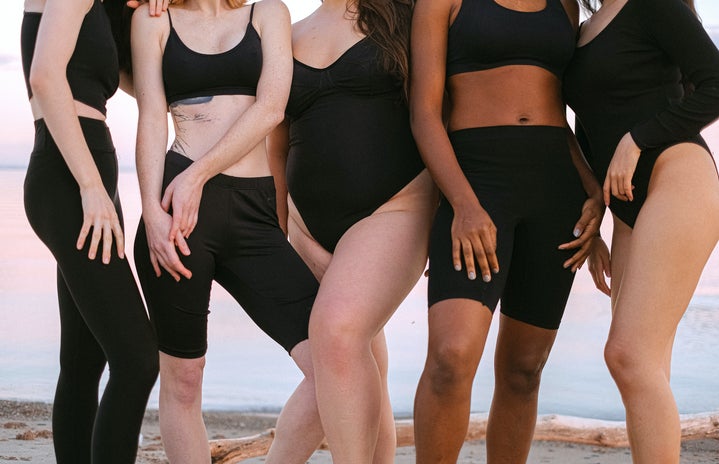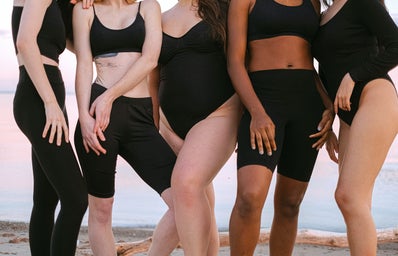“Try this for a flat stomach overnight!”
“How to get abs it’s two weeks!”
Social media has long been dominated by headlines praising a small, thin frame and restrictive diet culture to achieve “the perfect body”. These constant social comparisons and pressures have led young women to experience increased body dissatisfaction.
Studies at Stanford University and the University of Massachusetts found that 70% of college women say they feel worse about themselves after reading women’s magazines.
“I had a really hard time with loving myself for what I am,” said Ashley Casucci, 19, “I picked up unhealthy habits: not eating three meals a day, or not eating at all.”
Twenty million women, and ten million men, suffer from a clinically significant eating disorder at some time in their life, of which 90 percent are women between ages 12 and 25.
Trends pop-up across social media where girls compare themselves to others, actively skip meals, and promote the stigma ‘college girls live off iced coffee and don’t eat.’ These posts normalize negative body image and turn disordered eating into a trendy topic.
Psychologists Marika Tiggermann and Isabella Anderberg conducted a study among 305 women aged 18-30 evaluating their body dissatisfaction before and after viewing an “Instagram vs. Reality” post. Those who viewed the “reality” image displayed lower levels of body dissatisfaction, while those who were only shown the re-touched image reported increased body dissatisfaction after viewing the post.
“You start to critique your lifestyle,” says Nicole Grimes, 19, on viewing filtered through and edited content on social media, “one thing leads to another and suddenly, you don’t like what you currently have.”
Acknowledging the influence social media has over their mental and physical health, many people are taking steps to wipe their feeds of negative influence and replace their following page with motivational influencers and professionals.
“I unfollowed all of the models I followed on Instagram. It definitely affected me seeing it every day. So I took the effort to follow things that would help me become the best version of myself instead, to keep positive energy,” says Casucci.
“I’m now watching people like Luna Montana and Linda Sun, they really preach body positivity and confidence. They send a positive message,” adds Grimes.
Companies and influencers promoting inclusivity and self-acceptance have grown over the past decade, picking up in 2019 thanks to plus-size model and activist Ashley Graham, and brands like Aerie by American Eagle’s #AerieREAL campaign featuring real women of all backgrounds and identities as Aerie models.
The rise of TikTok in 2020 has led to a new platform for body positivity. Creators like Sienna Mae Gomez and Victoria Garrick promote self-love and the message that “food is fuel” – not something teenage girls should restrict themselves from.
Garrick opens up on her TikTok and Youtube channel about her past struggles with eating disorders and body dysmorphia. She shares her experience with followers and offers guidance on how to find self-acceptance. Garrick reminds her viewers that it’s okay to struggle some days and that social media is a highlight reel.
Gomez, 16, has taken TikTok by storm after posting a viral video celebrating her body and showing off her curves.
Gomez shows how posture, clothing, and camera angles can change one’s appearance to remind her followers that their body is beautiful both ways and real bodies have curves, hip dips, and stomach rolls.
“It’s been exciting to see so many women of all different shapes and sizes, all different backgrounds, coming together, and posting videos celebrating our bodies. This idea that we have to look a certain way is on its way out,” shares Garrick in an interview with Acess Hollywood.
Self and body acceptance is not something that will occur overnight, but it is something people are actively working to promote for their peers and future generations.
“People are realizing that [diet culture] is a negative mindset and new parents are raising their children promoting body positivity,” says Grimes, thinking of her younger cousin who is growing up in a new age of self-image.
Positive influencers and professionals are now leading a new conversation in the media; sharing self-growth and concepts of self-acceptance to pass on to the impressionable generations to come.
* * *
Sources:
Casucci, A. (2020). Personal communication [virtual interview].
Get the facts. National Organization of Women (2020). https://now.org.
Grimes, N. (2020) Personal communication [in person interview].
Fardouly, J., & Vartanian, L. R. (2016). Social media and body image concerns: Current research and future directions. Current Opinion in Psychology, 9, 1-5. https://doi.org/10.1016/j.copsyc.2015.09.005.
Tiggemann, M., & Anderberg, I. (2020). Social media is not real: The effect of ‘Instagram vs reality’ images on women’s social comparison and body image. New Media & Society, 22(12), 2183–2199. https://doi.org.
Watch Access Hollywood interview: TikTok stars Victoria Garrick & Sienna Mae Gomez celebrate body confidence. (2020). https://www.nbc.com.


